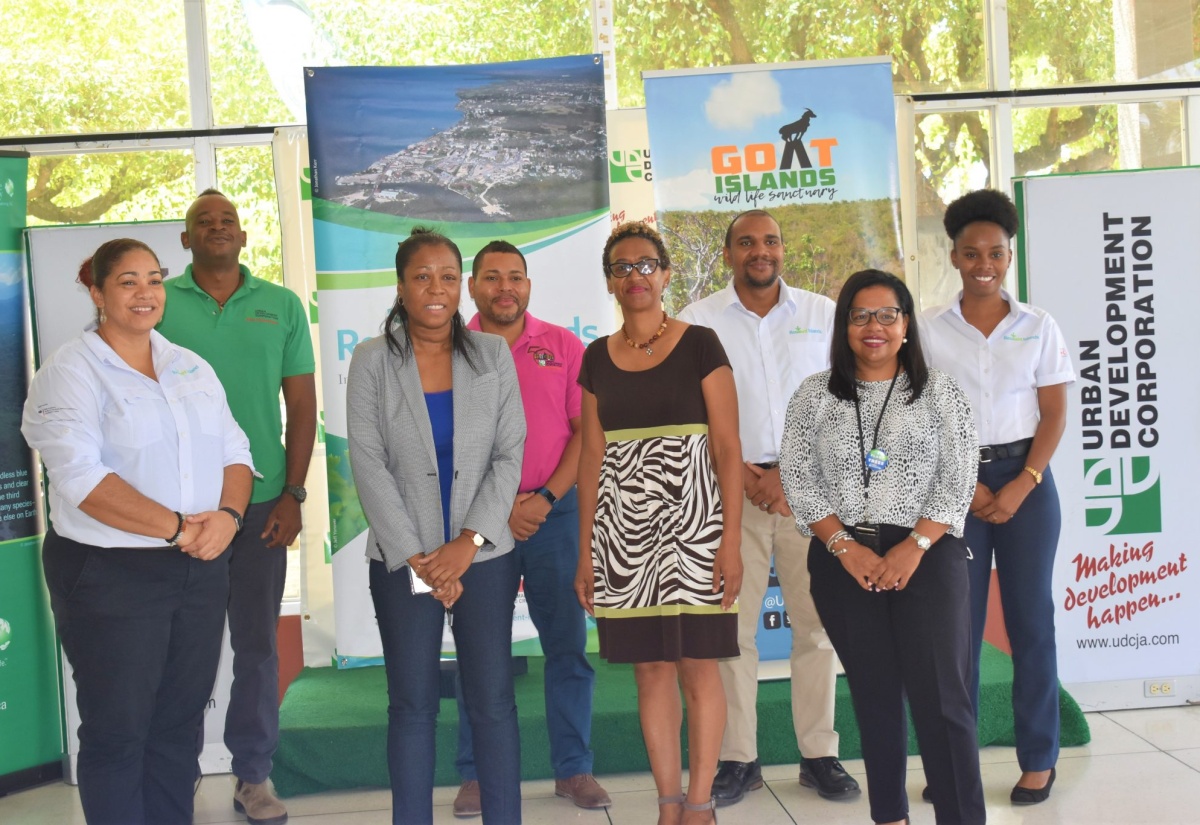Goat Islands Wildlife Sanctuary Gets Support
By: , June 27, 2020The Full Story
Approximately USD$50,000 in services from The Nature Conservancy
The Urban Development Corporation’s (UDC) Goat Islands Wildlife Sanctuary project has received technical services from The Nature Conservancy (TNC) valued at approximately USD$50,000.
The conservation organization has supported UDC’s work at Goat Islands and Old Harbour Bay through the sharing of research data and providing other critical services to include extensive drone mapping.
TNC, via the climate adaptation initiative Resilient Islands, has continued its collaboration with the UDC to advance these significant projects of ecological benefit. Resilient Islands is a partnership between TNC and the International Federation of the Red Cross and Red Crescent Societies to help communities adapt to climate change in the Caribbean. In collaboration with the Jamaica Red Cross, this initiative is promoting the use of coastal habitats, such as those found in Old Harbour Bay and Goat Islands, to reduce climate risks.
Resilient Islands also develops the research and tools that empower governments, partners and communities to implement sustainable development plans that prioritize nature, and promotes a shift in behaviour and policies to include the protection of natural infrastructure as integral to Jamaica’s long-term economic and social development.
The UDC has benefitted from this collaboration, specifically as it continues its pre-assessment of Goat Islands towards the establishment of a Wildlife Sanctuary. To aid the pre-assessment, TNC donated extensive Drone Mapping data to the Corporation. This data will be used in the zoning of the Goat Islands, to identify potential areas for development, identification of potential nesting areas for the Jamaican Iguana and the identification of the potential areas for the re-introduction of the various endemic plants and animals. This data, which amounts to approximately USD$47,000.00, was officially handed over to the UDC on Friday 26 June, 2020.
The Corporation and its partners have been collecting baseline data on the flora and fauna of the Great Goat Island as a part of the management plan for the establishment of the Wildlife Sanctuary. Sara Simpson, Director, Natural Resource Management & Environment Planning at UDC expressed the significance of this donation. “This contribution from TNC will go a long way in bringing the Goat Islands Wildlife Sanctuary to life. The drone mapping and imaging will complement the extensive pre-assessment work that has to go into the project. Given that Goat Islands has many elements that are uniquely Jamaican, including the reintroduction of the Jamaican Iguana to the space, TNC’s support is of national consequence. The UDC is exceedingly grateful to TNC for their support.”
UDC’s Deputy General Manager, Planning Development and Project Management, Loy Malcolm spoke to the importance of data in planning and development. “Data is essential to what we do at the UDC as it guides our decision-making processes and because this project will have a major development benefit for the country, this partnership with TNC is significant. I would liken the environment to the body’s white blood cells, in that, it protects and defends us, as such we must make every effort to protect our environment. At UDC, we believe that conservation is a critical part of sustainable development. Consequently, the work at Goat Islands must be guided with the right background information from the onset.”
TNC’s contribution went even further to include Satellite Imagery of Goat Islands that will be used in the analysis of the drone mapping to conduct ecological assessments and Geographic Information System (GIS) analysis. TNC has also committed to conducting a Rapid Ecological Assessment of the Old Harbour Bay. This will provide baseline data to inform the development of the Goat Islands and its nearby communities.
In speaking to the contribution, Donna Blake, Jamaica Programme Director, TNC stated “At TNC we endeavour to be proactive in finding natural solutions to address and reduce climate change risks, and these solutions are at the heart of the Resilient Islands program. As such it was a natural fit to partner with the UDC and share resources as we collectively work to protect and restore natural ecosystems and thereby improve the resilience of our coastal communities and protect and augment the management of our unique Jamaican habitats and the associated wildlife.”
Resilient Islands is part of the International Climate Initiative (IKI). The Federal Ministry for the Environment, Nature Conservation and Nuclear Safety (BMU) supports this initiative on the basis of a decision adopted by the German Bundestag. To learn more about Resilient Islands, please visit www.coastalresilience.org/resilient-islands.
About TNC
The Nature Conservancy is a global conservation organization dedicated to conserving the lands and waters on which all life depends. Guided by science, we create innovative, on-the-ground solutions to our world’s toughest challenges so that nature and people can thrive together. We are tackling climate change, conserving lands, waters and oceans at an unprecedented scale, providing food and water sustainably and helping make cities more sustainable. Working in 72 countries, we use a collaborative approach that engages local communities, governments, the private sector, and other partners. To learn more, visit www.nature.org or follow @nature_press on Twitter.


